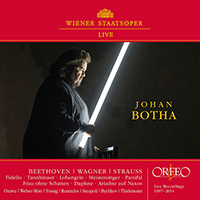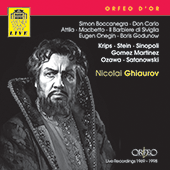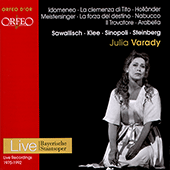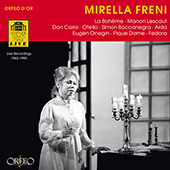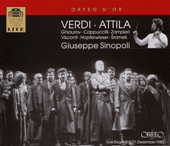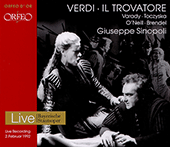Giuseppe Sinopoli
Giuseppe Sinopoli began his musical studies as an organist at the Messina Conservatory. However between 1965 and 1967 he simultaneously studied music in Venice, and medicine and psychiatry in Padua; and it was only after graduating with a degree in medicine and surgery in 1972, having completed dissertations (as a psychiatrist) on the connection between acoustics and the mind, and (as a doctor) on criminal anthropology, that he chose instead to pursue a career as a musician. Clearly a man of unusually wide abilities and interests, in his later years Sinopoli also became deeply fascinated by cultural archaeology and collected classical antiquities.
He was appointed professor of contemporary and electronic music at the Venice Conservatory in 1972, at the same time studying composition and conducting with Bruno Maderna and Franco Donatoni and conducting with Hans Swarowsky in Vienna from 1972. It was in 1975, at the Royan Festival, that Sinopoli made his debut as a conductor; during the same year he formed the Bruno Maderna Ensemble for the performance of contemporary music. His debut as a conductor of opera followed with Verdi’s Aida in Venice in 1978; but during this period Sinopoli worked primarily as a composer, accepting commissions from musical organisations in France, Germany and Holland. The climax of this phase of his career was reached in 1980 with the first performance of his opera Lou Salomé at the Bavarian State Opera in Munich, which he himself conducted. Sinopoli then decided to cease composing in favour of conducting and his career developed rapidly. He made a highly successful debut, also in 1980, at the Deutsche Oper in Berlin with Verdi’s Macbeth, and went on to conduct a wide repertoire there, working closely with the director Götz Friedrich. His London debut was made with the London Sinfonietta in 1980, and he appeared at the Royal Opera House, Covent Garden in 1983, leading Puccini’s Manon Lescaut.
Sinopoli served as chief conductor of the Orchestra of the Accademia di Santa Cecilia, Rome, from 1983 to 1987, and in 1984 was appointed as chief conductor of the Philharmonia Orchestra in succession to Riccardo Muti; having been named as the orchestra’s music director in 1987, he held this position until 1994. He made his debuts at the Metropolitan Opera, New York and at the Bayreuth Festival in 1985 with Puccini’s Tosca and Wagner’s Tannhäuser respectively. During the following fifteen seasons he conducted ninety-three performances at Bayreuth. Having first appeared in Japan conducting Puccini’s Madama Butterfly in 1987, Sinopoli subsequently appeared frequently in that country, where he was very highly regarded. In 1991 he took up his final permanent position, as chief conductor of the Dresden Staatskapelle, after deciding not to take up a similar post at the Deutsche Oper. His debut at La Scala, Milan, was made relatively late, in 1994, with Richard Strauss’s Elektra, and in 1998 Sinopoli was appointed conductor laureate both of the Maggio Musicale in Florence and of the city’s Teatro Communale. He died unexpectedly of a heart attack while conducting Aida at the Deutsche Oper in a performance that was intended to herald his return to this opera house.
Although Sinopoli claimed that the conductor should make himself invisible to the orchestra, in fact he possessed a marked and compelling propensity to re-invent the music which he conducted, often employing his knowledge as a psychiatrist to seek deeper meanings in these works. As a doctor he was able to dissect structures with clarity while as a composer he was able to re-create with individuality. His frequently unorthodox approach to interpretation stimulated deep horror among Anglo-Saxon critics, while at the same time generating enormous popularity and respect in Japan. Like many major conductors he was able to create an identifiable orchestral sound, generally characterised by beautiful string textures and subtle woodwind and brass playing. His recorded repertoire, predominantly made in association with the German labels Deutsche Grammophon and Teldec, was extensive. Of especial note were his accounts of the symphonies of Bruckner and Mahler and of the operas and orchestral music of Richard Strauss, whose psychological insight clearly held considerable fascination for him. To those willing to adjust their preconceptions of familiar scores, Sinopoli brought new revelations.
© Naxos Rights International Ltd. — David Patmore (A–Z of Conductors, Naxos 8.558087–90).








